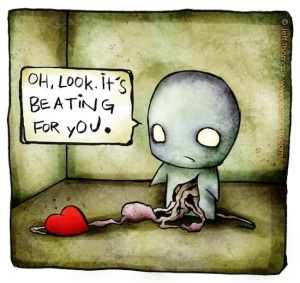I think it is safe to say that anyone reading this blog has a healthy appreciation for the beauty of language, and words. Both the glory of words, and the drawback, is they are simple used to represent concepts – they are not things in and of themselves. For example, what comes to mind with the word shambles? Likely “a state of total disorder”. But it comes from the Latin scamellum, for bench, which became a word for stall which lead to Shambles being a butcher’s slaughterhouse, or meat market, which quite naturally lead to the way we use it today in reference to our kids rooms being messy (not as a scene of great carnage).
Words change. The concepts they represent change. But the beauty of a thing is not in its permanence. The same is true of books, of stories, as a whole – they represent concepts and ideas. Conversely from words themselves, though, the very fact that they represent deeper ideas increases their longevity.
Because any jackass can simply recount events. They can even arrange it into a three-act structure and tell a story out of it. Doing that takes time and effort, to be sure, and might even contain some pretty words, but it will be entirely forgettable if it doesn’t express a deeper idea.
A great example of this is Fight Club. Everyone knows exactly two things about Fight Club:
- The first two rules of Fight Club
- The twist at the end
 But that is not why people remember Fight Club (it is Brad Pitt’s abs in the movie). Because Fight Club, for being bokers, violent, having memorable lines and the all-time best twist, is memorable because of the ideas it represents. It’s about finding your identity, while also trying to find your place in the world and accept what you can and cannot change. All of that, painted with the brushstrokes of bull-headed masculinity – which, incidentally, is part of the concept and why it works.
But that is not why people remember Fight Club (it is Brad Pitt’s abs in the movie). Because Fight Club, for being bokers, violent, having memorable lines and the all-time best twist, is memorable because of the ideas it represents. It’s about finding your identity, while also trying to find your place in the world and accept what you can and cannot change. All of that, painted with the brushstrokes of bull-headed masculinity – which, incidentally, is part of the concept and why it works.
I’ve been rambling about Poe a lot lately , mostly because I am reading through his works again, and because he is brilliant at things like this (Confession: Poe is the only author I enjoy MORE after writing in earnest). Perhaps – picking one story to embody this is a nightmarish chore – but perhaps the story that embodies this best is the Tell-Tale Heart. Because here, we have to parse it in twain: Narration v Narrative (roll credits). Put simply:
Narration: dude commits murder and is consumed with guilt.
Narrative: We’re really just deluding ourselves, aren’t we?
It’s a straightforward story – narration – isn’t it? First person, linear, with the plot to kill the old man, his execution, and the guilt consuming him to the point of confessing to the crime. All the while, our narrator is telling us how sane his:
Now this is the point. You fancy me mad. Madmen know nothing. But you should have seen me. You should have seen how wisely I proceeded –with what caution –with what foresight –with what dissimulation I went to work!
All the while, we read it thinking this dude is nuts, because a madman is the one who kills methodically, without apparent provocation. Certainly we – I – am incapable of such madness, because we are sane!
Aren’t we?
Are we?
The narrator is sure of his own sanity, even as his own actions belie him. The first-person narrative (which should only be used for this reason, seriously stop writing everything in first-person) makes this all the more jarring, because we interpret it as our own thoughts. And who hasn’t reassured themselves that I am sane, look at how sane I am being right now (you guys do this too, right?).
Thus- the narration becomes the narrative. Our eye turns from the story and the very obvious madness before us, and asks, in the space of a couple thousand words, are we really who we think we are? The story, the question, then haunts us, just as the beating of the heart haunted the narrator.
If you outline, you likely write down the beats of a story – the essential narrative plot points. But do you write down what your story is, what it represents when distilled down? Macbeth said it best:
…a tale
Told by an idiot, full of sound and fury,
Signifying nothing.
That is what is to be avoided – there is enough forgettable entries into literature. If you can represent ideas and concepts in a way that is deeper and stronger than your narration, you will end up with a better, more memorable work – one which signifies something.
-DESR
This great, thanks!